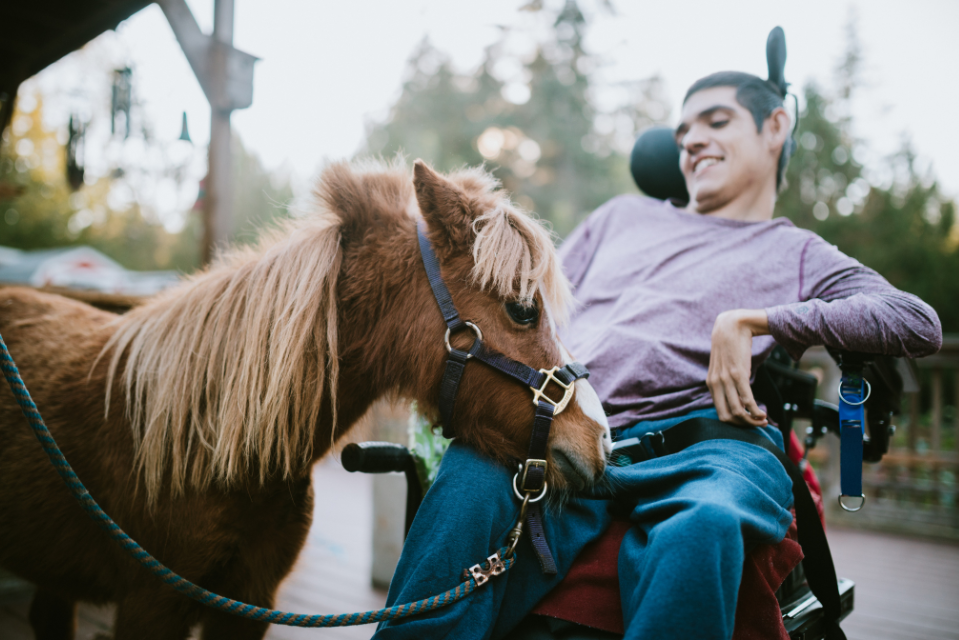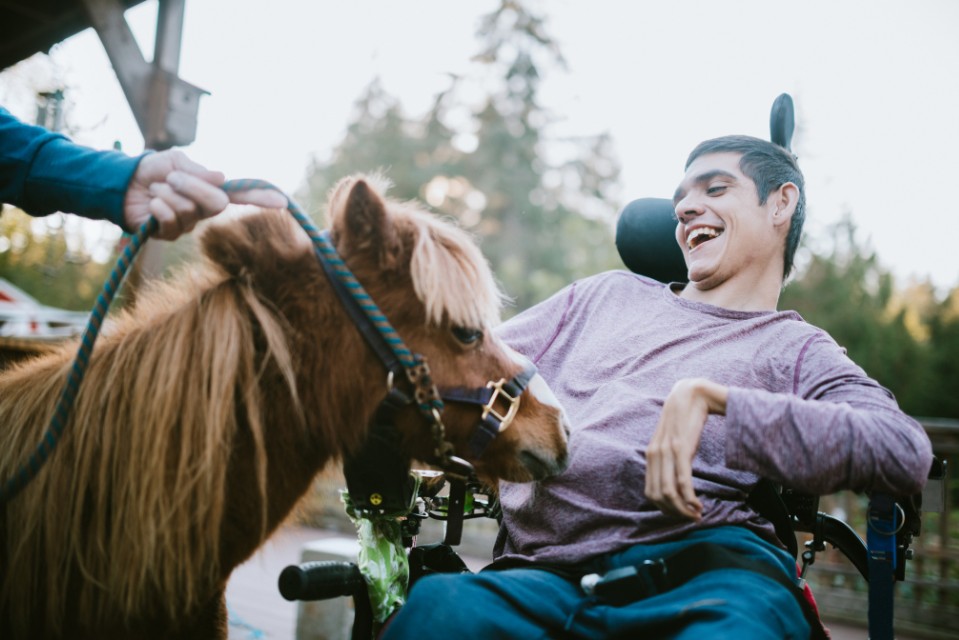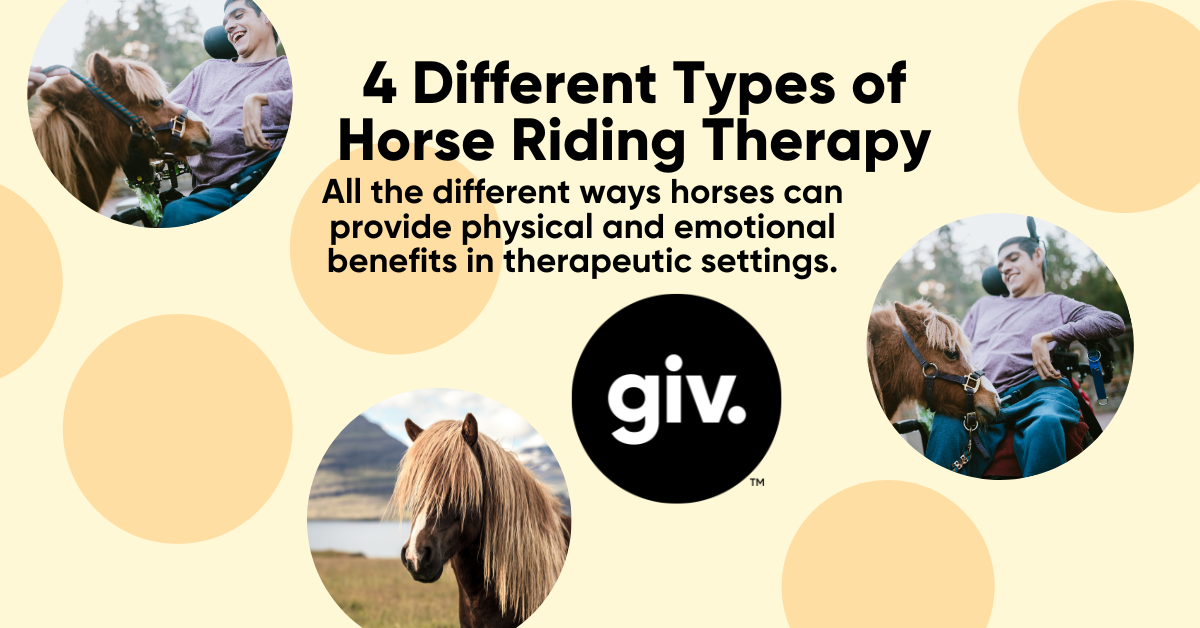Horse Riding Therapy, also known as Equine Assisted Therapy, stands as a beacon of hope in the realm of disability care, offering a unique and effective avenue for promoting mental and physical well-being. In this article, we delve into the world of Horse Riding Therapy, exploring its origins, therapeutic benefits, and transformative potential. From improving communication skills to enhancing gross motor function, Horse Riding Therapy offers a holistic approach to addressing the diverse needs of individuals with disabilities.
Horse Riding Therapy
Horse Riding Therapy, often referred to as Equine Assisted Therapy, is a structured intervention that utilizes interactions with horses to address physical, emotional, and mental health challenges. Participants engage in activities such as horseback riding, grooming, and ground-based exercises under the guidance of certified professionals. Through these interactions, individuals experience a sense of connection, empowerment, and healing.
Understanding Equine Assisted Therapy
Equine Assisted Therapy encompasses a range of interventions that incorporate interactions with horses to achieve therapeutic goals. From Therapeutic Riding, where individuals learn horseback riding skills while addressing physical and emotional challenges, to Equine Assisted Learning, which focuses on experiential learning and personal development, this therapy offers a multifaceted approach to healing.
The Therapeutic Benefits of Horse Riding
Horse Riding Therapy offers numerous therapeutic benefits for individuals with disabilities, encompassing both physical and mental aspects. The rhythmic motion of horseback riding stimulates core muscles, improves balance, and enhances coordination, making it an ideal form of physical therapy. Moreover, the emotional bond formed between humans and horses fosters feelings of trust, empathy, and self-confidence, providing invaluable support for mental health challenges such as anxiety, depression, or trauma.
Equine Assisted Therapy Programs
Equine Assisted Therapy programs are offered at various facilities, including therapeutic riding centers and equine therapy clinics. These programs cater to individuals of all ages and abilities, providing customized interventions to address specific therapeutic goals. Participants engage in a range of activities, from horseback riding sessions to ground-based exercises, all designed to promote physical and emotional well-being.

The Role of Equine Therapists
Equine Therapists play a crucial role in facilitating Horse Riding Therapy sessions and ensuring their effectiveness. These professionals undergo specialized training and certification to work with both horses and clients in a therapeutic setting. Equine Therapists collaborate with mental health professionals and other healthcare providers to develop comprehensive treatment plans that address the holistic needs of each individual.
The Therapeutic Value of Horse-Human Interactions
The therapeutic value of horse-human interactions lies in the unique qualities of horses as sentient beings. Horses are highly attuned to human emotions and provide immediate feedback and nonverbal cues during therapy sessions. This creates opportunities for individuals to develop emotional awareness, interpersonal skills, and self-confidence. The rhythmic motion of horseback riding also promotes relaxation, mindfulness, and stress reduction, fostering emotional regulation and resilience.
Equine Therapy for Mental Health Treatment
Equine Therapy has emerged as a valuable adjunctive treatment for individuals struggling with mental health disorders such as anxiety, depression, PTSD, and ADHD. Research has shown that interactions with horses can reduce symptoms of anxiety and depression, improve mood and self-esteem, and enhance emotional regulation and coping skills. Equine-assisted interventions offer a unique therapeutic experience that combines the benefits of traditional psychotherapy with the healing power of nature and animals.
Equine Therapy for Physical Rehabilitation
In addition to its mental health benefits, Equine Therapy is effective in physical rehabilitation for individuals with disabilities or injuries. The rhythmic movement of horseback riding stimulates core muscles, improves balance and coordination, and enhances gross motor function. Ground-based activities such as grooming and leading horses also target fine motor skills and proprioceptive awareness. Equine Therapy offers a dynamic and engaging approach to physical rehabilitation, promoting mobility and independence.
Promoting Inclusion and Accessibility
Equine Therapy promotes inclusion and accessibility by offering therapeutic opportunities for individuals of all ages and abilities. Many programs offer scholarships, sliding-scale fees, and accessible facilities to ensure that therapy is accessible to everyone. By removing barriers to participation and promoting diversity, Equine Therapy fosters an inclusive environment where all individuals can benefit from the healing power of horses.
Equine Assisted Learning
Equine Assisted Learning (EAL) is a form of experiential education that utilizes interactions with horses to promote personal and professional development. Participants engage in activities such as problem-solving, teamwork, and leadership exercises, all facilitated by horses. EAL fosters skills such as communication, empathy, and self-awareness, making it an effective tool for personal growth and learning.

Equine Assisted Psychotherapy
Equine Assisted Psychotherapy (EAP) is a form of therapy that incorporates interactions with horses into the therapeutic process. Participants engage in activities such as grooming, leading, and riding horses, while exploring issues related to mental health and well-being. EAP provides a safe and supportive environment for individuals to address emotional challenges, develop coping skills, and enhance self-esteem.
Equine Assisted Activities
Equine Assisted Activities (EAA) encompass a variety of recreational and leisure activities that involve interactions with horses. These activities may include horseback riding, carriage driving, or vaulting, and are designed to promote physical fitness, socialization, and enjoyment. EAA provides individuals with disabilities the opportunity to experience the joy and benefits of being around horses in a fun and supportive environment.
Therapeutic Horseback Riding
Therapeutic Horseback Riding, also known as Therapeutic Riding, is a structured program that utilizes horseback riding as a form of physical and emotional therapy. Participants engage in riding sessions tailored to their individual needs and goals, under the guidance of certified instructors. Therapeutic Riding promotes physical fitness, improves balance and coordination, and enhances self-confidence and emotional well-being.
Equine Facilitated Learning
Equine Facilitated Learning (EFL) is an educational approach that uses interactions with horses to promote learning and personal development. Participants engage in activities such as problem-solving, decision-making, and leadership exercises, all facilitated by horses. EFL fosters skills such as communication, teamwork, and empathy, making it an effective tool for academic and personal growth.
Equine Therapy for Children
Equine Therapy has shown promising results in treating children with a variety of physical, emotional, and developmental challenges. The gentle nature of horses and the dynamic environment of the barn provide children with opportunities for growth, learning, and healing. Equine Therapy can benefit children with autism spectrum disorders, ADHD, cerebral palsy, and other conditions by promoting social skills, emotional regulation, and physical fitness.
Equine Therapy for Adults
Equine Therapy is equally beneficial for adults facing mental and physical health challenges. The serene environment of the barn and the unconditional acceptance of horses create an ideal setting for healing and personal growth. Equine Therapy can help adults cope with stress, manage anxiety and depression, and improve self-esteem and confidence. It can also be effective in addressing issues related to trauma, addiction, and relationship difficulties.

Equine Therapy for Veterans
Equine Therapy has gained recognition as a valuable intervention for veterans dealing with the physical and psychological toll of military service. Horses provide a unique form of support and connection for veterans, helping them navigate the challenges of reintegration into civilian life. Equine Therapy offers veterans a safe space to process traumatic experiences, develop coping strategies, and rebuild trust and confidence. Programs tailored specifically for veterans often incorporate elements of adventure therapy and group counseling, providing opportunities for camaraderie and peer support.
Equine Therapy for Individuals with Traumatic Brain Injuries
Equine Therapy has shown promise in assisting individuals recovering from traumatic brain injuries (TBI). The rhythmic motion of horseback riding can stimulate neural pathways, promoting cognitive function and motor skills. Additionally, interactions with horses can improve emotional regulation and communication abilities, aiding in the rehabilitation process. Equine Therapy offers individuals with TBI a unique and enjoyable approach to recovery that complements traditional rehabilitation methods.
Equine Therapy for Individuals with Autism Spectrum Disorders
Equine Therapy has been found to be particularly beneficial for individuals with autism spectrum disorders (ASD). The structured nature of horseback riding and the predictable environment of the barn can help individuals with ASD feel more comfortable and at ease. Interactions with horses can improve social skills, sensory processing, and emotional regulation in individuals with ASD. Equine Therapy offers a non-judgmental and supportive space for individuals with ASD to thrive and connect with others.
Equine Therapy for Individuals with Physical Disabilities
Equine Therapy is also highly effective in addressing the unique needs of individuals with physical disabilities. The gentle and rhythmic motion of horseback riding can improve muscle tone, balance, and coordination in individuals with mobility impairments. Ground-based activities such as grooming and leading horses can enhance fine motor skills and proprioception. Equine Therapy empowers individuals with physical disabilities to explore their capabilities and achieve greater independence.
Equine Therapy for Individuals with Mental Health Disorders
Equine Therapy has been increasingly recognized as a valuable adjunctive treatment for individuals with various mental health disorders. Interactions with horses can reduce symptoms of anxiety, depression, PTSD, and other mood disorders, improving overall well-being. The therapeutic bond formed between humans and horses fosters feelings of trust, empathy, and self-confidence, providing individuals with a sense of purpose and connection. Equine Therapy offers a holistic and experiential approach to healing that complements traditional psychotherapy.
Horse Therapy Locations in Utah:
- Horse Mountain Academy, Ephriam UT: Equine Facilitated Psychotherapy
- Haskell Riding Academy, St. George UT: Therapeutic Horsemanship, Equine Facilitated Psychotherapy
- Animals 4 Healing, Murray UT: Equine Facilitated Psychotherapy
- South Jordan Horse Lessons, South Jordan UT: Therapeutic Horsemanship
- Turnabout Ranch, Escalante UT: Equine Facilitated Psychotherapy
- National Ability Center, Park City UT: Therapeutic Horsemanship, Equine Facilitated Psychotherapy, Equine Assisted Learning
- Courage Reins, Highland UT: Therapeutic Horsemanship, Equine Facilitated Psychotherapy, Hippotherapy
- Hoofbeats to Healing, Saratoga Springs UT: Therapeutic Horsemanship
- Harness Your Power, Marriott Slaterville, UT: Equine Facilitated Psychotherapy
- Unbridled Hope and Healing, West Jordan UT: Therapeutic Horsemanship, Equine Facilitated Psychotherapy, Hippotherapy
- Heading Home, West Jordan UT: Equine Facilitated Psychotherapy
- Crossing Arrows Ranch, Tremonton UT: Equine Facilitated Psychotherapy
- Stable Environment, St. George UT: Equine Facilitated Psychotherapy
- A Helping Hoof, Grantsville UT: Equine Facilitated Psychotherapy
- Bridleup Hope, Alpine UT: Equine Facilitated Psychotherapy
- Windstone Counseling: Equine Facilitated Psychotherapy
- Daybreak Pasture, Heber City UT: Equine Assisted Learning
- Strides Pediatric Therapy, Eagle Mountain UT: Therapeutic Horsemanship, Equine Facilitated Psychotherapy, Hippotherapy
- Angel’s Landing, Eagle Mountain UT: Equine Facilitated Psychotherapy
- Hope Reins Healing, Washington UT: Equine Facilitated Psychotherapy
- Falcon Ridge Ranch, Virgin UT: Equine Facilitated Psychotherapy
- Whispering Canyons, Logan UT: Therapeutic Horsemanship
- Rope, Race, Ride, Hurricane UT: Equine Facilitated Psychotherapy
- Camp K, Salt Lake City UT: Therapeutic Horsemanship
- Freedom Riders, Ogden UT: Therapeutic Horsemanship
Conclusion
In conclusion, Horse Riding Therapy, or Equine Assisted Therapy, offers a holistic approach to promoting mental and physical well-being for individuals with disabilities. From improving communication and social skills to enhancing physical fitness and emotional resilience, Equine Therapy has the power to transform lives. As we continue to explore the therapeutic benefits of interactions with horses, it is evident that Equine Therapy holds immense potential as a complementary intervention in the field of disability care. By harnessing the healing power of horses, we can create a more inclusive and supportive society where all individuals have the opportunity to thrive.






